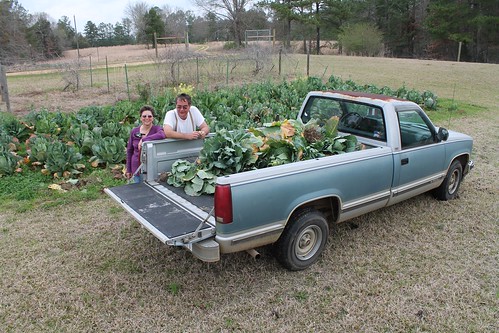
For many farmers, the lessons of agriculture begin at a young age. This is true for Florence, Miss., farmer Kathy Stoltzfus, who says that her dad taught her what she knows when she was a child. She has fond memories of running barefoot through rice fields and the taste of freshly grown food.
Now Stoltzfus and her husband, Bob, run a small farm in central Mississippi, where they raise fruits, vegetables and eggs. Her farming experience, coupled with his grocer experience, makes them a powerhouse at the Mississippi Farmers Market in Jackson, where they sell many different vegetables, including a variety of greens, broccoli, onions, radishes, peas, tomatoes, squash and zucchini. Their eggs are a hit, selling out every Saturday at the market.
The Stoltzfuses started selling at the farmer’s market as part-time farmers in 2007, but two years later, the couple decided that they would leave their day jobs to farm full-time. While operating a small farm is hard work, they are happy with their successes and grateful for help from USDA’s Natural Resources Conservation Service (NRCS), an agency that helps private landowners implement conservation to protect the environment and improve productivity.
They learned about NRCS from a fellow producer at the market who told them about the technical assistance and cost-share assistance offered by the agency. Through NRCS’ Environmental Quality Incentives Program, their farm is on pace to be certified as organic as early as the end of this year.
NRCS also worked with the couple to build a seasonal high tunnel to keep their fruits and vegetables safe from the cold weather and construct a wildlife fence to protect their crops from hungry deer and rabbits.

High tunnels have a metal frame wrapped in plastic and are easy and fairly cheap to build. They are designed to extend the growing season into the cold months, helping to increase productivity, keep plants at a steady temperature and even conserve water and energy. NRCS funds high tunnels as part of USDA’s Know Your Farmer, Know Your Food initiative, launched in 2009 to help local food systems thrive.
The Stoltzfuses plan to continue enlarging their operation. With 32 acres at their disposal, they hope to start a small beef cattle operation.
Both say that they’re doing what they’re meant to do. Bob enjoys the quiet of the countryside, and Kathy is happy to have returned to her heritage.
Learn more about the Environmental Quality Incentives Program
Follow NRCS on Twitter.
Check out other conservation-related stories on the USDA blog.


